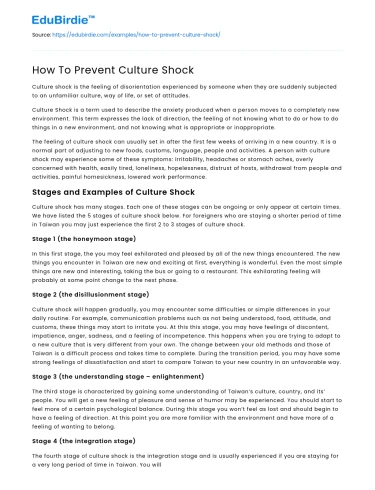Culture shock is the feeling of disorientation experienced by someone when they are suddenly subjected to an unfamiliar culture, way of life, or set of attitudes.
Culture Shock is a term used to describe the anxiety produced when a person moves to a completely new environment. This term expresses the lack of direction, the feeling of not knowing what to do or how to do things in a new environment, and not knowing what is appropriate or inappropriate.
Save your time!
We can take care of your essay
- Proper editing and formatting
- Free revision, title page, and bibliography
- Flexible prices and money-back guarantee
The feeling of culture shock can usually set in after the first few weeks of arriving in a new country. It is a normal part of adjusting to new foods, customs, language, people and activities. A person with culture shock may experience some of these symptoms: irritability, headaches or stomach aches, overly concerned with health, easily tired, loneliness, hopelessness, distrust of hosts, withdrawal from people and activities, painful homesickness, lowered work performance.
Stages and Examples of Culture Shock
Culture shock has many stages. Each one of these stages can be ongoing or only appear at certain times. We have listed the 5 stages of culture shock below. For foreigners who are staying a shorter period of time in Taiwan you may just experience the first 2 to 3 stages of culture shock.
Stage 1 (the honeymoon stage)
In this first stage, the you may feel exhilarated and pleased by all of the new things encountered. The new things you encounter in Taiwan are new and exciting at first, everything is wonderful. Even the most simple things are new and interesting, taking the bus or going to a restaurant. This exhilarating feeling will probably at some point change to the next phase.
Stage 2 (the disillusionment stage)
Culture shock will happen gradually, you may encounter some difficulties or simple differences in your daily routine. For example, communication problems such as not being understood, food, attitude, and customs, these things may start to irritate you. At this this stage, you may have feelings of discontent, impatience, anger, sadness, and a feeling of incompetence. This happens when you are trying to adapt to a new culture that is very different from your own. The change between your old methods and those of Taiwan is a difficult process and takes time to complete. During the transition period, you may have some strong feelings of dissatisfaction and start to compare Taiwan to your new country in an unfavorable way.
Stage 3 (the understanding stage – enlightenment)
The third stage is characterized by gaining some understanding of Taiwan’s culture, country, and its’ people. You will get a new feeling of pleasure and sense of humor may be experienced. You should start to feel more of a certain psychological balance. During this stage you won’t feel as lost and should begin to have a feeling of direction. At this point you are more familiar with the environment and have more of a feeling of wanting to belong.
Stage 4 (the integration stage)
The fourth stage of culture shock is the integration stage and is usually experienced if you are staying for a very long period of time in Taiwan. You will probably realize that Taiwan has good and bad things to offer you. This integration is period is characterized by a strong feeling of belonging. You will start to define yourself and begin establishing goals.
Stage 5 (the re-entry stage)
The final stage of culture shock occurs when you return to your home country. This stage of culture shock generally only effects people who have been in Taiwan for a very long period of time (though many feel it after having lived overseas for only as little as 6 months). You may find that things are no longer the same in your home country. For example, some of your newly acquired customs are not in use in your own country. Your friends have changed and your family may have as well. You may feel like you don’t fit in back home.
These stages are present at different times and you will have your own way of reacting in each stage. As a result some you may find some stages can be longer and more difficult than others. There are many factors contribute to the duration and effects of culture shock. For example, your state of mental health, personality, previous experiences, socio-economic conditions, familiarity with the language, family, and level of education.
Culture shock is a subcategory of a more universal construct called transition shock. Transition shock is a state of loss and disorientation predicated by a change in one's familiar environment that requires adjustment. There are many symptoms of transition shock, including:
- Boredom
- Compulsive eating/drinking/weight gain
- Desire for home and old friends
- Excessive concern over cleanliness
- Excessive sleep
- Feelings of helplessness and withdrawal
- Getting 'stuck' on one thing
- Glazed stare
- Homesickness
- Hostility towards host nationals
- Impulsivity
- Irritability
- Mood swings
- Physiological stress reactions
- Stereotyping host nationals
- Withdrawal
So, in conclusion, These are the best tips to prevent or deal with culture shock
- Accept and Adapt.
- Learn and be Open-Minded.
- Positive Attitude.
- Touch Base with Home.
- Don't Compare.
- Stay Active.
- Explore






 Stuck on your essay?
Stuck on your essay?

